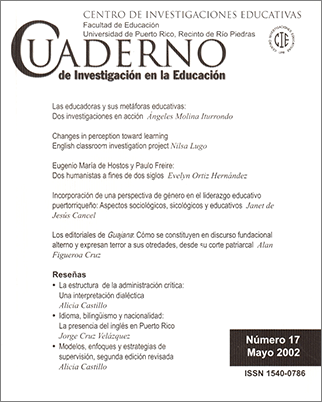Abstract
The poetry journal Guajana became known as one of the most controversial cultural productions of its time. Founded as a symbol of the Puerto Rican culture, it was committed to defend the ideals of freedom of speech as well as the separatist political values, elements that placed Guajana authors in the peephole of its readers and critics. Nevertheless, within the editorials of this journal, an innovative proposal of Puerto Rican literature was displayed, one that shows a marginal discourse characterized by a confronting academic speech that denounced the oppression of higher authorities and impositions of the North American metropolis values. Also, its editorials evidenced a terrifying testimony of a male power, not only because the incursion of women and not so masculine men in the social and cultural settings, but because of the imminent fall of male power that tries to hide its most precarious situation at the time. This is the most evident in the way editorial voice tried to oppress and ridicule its opponents and critics. The editorials in Guajana were transformed from an affirmation of quality and commitment to good literature to a mechanism of complaint, used by one of the most ignored collective groups composed those belonging to the marginal side. Thus, Guajana ended up reproducing, in its persecution and exclusion practices, the same attitudes and mechanisms of repression once criticized as being used by the imperialists, whites and erudite detractors.
How to cite:
Figueroa-Cruz, A. (2002). Los editoriales de Guajana: Cómo se constituyen en discurso funcional alterno y expresan terror a sus otredades, desde su corte patriarcal. Cuaderno de Investigación en la Educación, 17, 87-99. Retrieved from https://revistas.upr.edu/index.php/educacion/article/view/16336
The contents published in the Puerto Rico Journal of Education is freely distributed under open access practices, in accordance with the Creative Commons license, Attribution-NonCommercial 4.0 International (CC BY-NC 4.0). Through these principles, the journal and its authors allow readers to access, reproduce and share articles in full text. Users should give credit to authors in a reasonable way without suggesting they have their support. Under no circumstances, readers may make use of the contents for commercial purposes. The authors retain copyright on their works.

